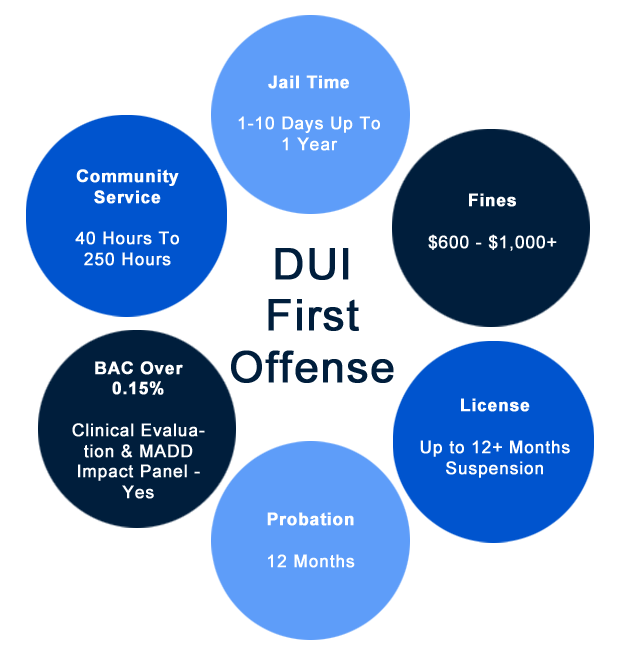
DUI First Offense in Georgia
It goes without saying, but the state of Georgia has no tolerance for driving under the influence. This is true of a lot of states, but in Georgia the penalties can be severe, even for those who have just been charged with their first DUI. The most important thing to know is that you have two cases stacked against you. The first set of charges apply to your driver’s license, impacting your ability to drive. The second set of charges will remain on your permanent criminal history as criminal charges. For many people, pleading guilty to any of these charges is simply not an option. That just leaves investing in an attorney to help have your charges reduced or dismissed altogether.
And it is important that you fight these charges. Because if you can’t have them reduced down to something like reckless driving or dismissed, they can have far-reaching impacts that can follow you around the rest of your life. They can impact your ability to find a job, especially in certain fields such as government or education. They can affect your current employment, losing your professional licenses or security clearances. They can hit you in the wallet, keeping you from securing a loan or a scholarship and increasing your insurance premiums. They can even result in you losing custody or visitation rights of children.

A skilled attorney can help ensure that none of this comes to pass. Their knowledge of the law will be a vital part of your defense. The attorneys at The Claiborne Firm have created an educational guide that answers many frequently asked questions about first offense DUI charges in Georgia. If we missed anything, please use the online form below to ask your questions, and we will return your inquiry within 24-hours in most cases.
Am I Required to Submit to A Blood Alcohol Content (BAC) Test?
Technically, no. In the state of Georgia, operating a motor vehicle is a privilege, one that you receive on condition of submitting to state-administered tests of your blood, breath or urine. This is what is known as “implied consent.” You are free to refuse testing at the time of the arrest, but doing so will trigger an automatic suspension of a minimum period of one year. The fact that you refused can also be used as evidence against you in establishing criminal charges.
If you do submit to a BAC test, you are also entitled under the law to additional tests at your own expense from a professional of your choosing. This is not always an option as some police officers will ignore the request, but sometimes this can help to provide contradictory evidence.
If I Refuse the Test, What Should I Do Next?
Upon refusing the test, you will be given a 1205 form notifying you of the arresting officer’s intention to suspend your Georgia driver’s license. At this point, you will have two options before you, either of which must be carried out within 30 days.
Appeal the Automatic Suspension of Your Driver’s License
The first option is to file an appeal for the automatic suspension of your license, which should be sent via certified mail and will carry a $150 filing fee. The law is very clear that you have 30 days to do this. After this deadline, there is little that can be done to preserve your ability to drive.
This will secure you an Automatic License Suspension (ALS) hearing. It’s important that you request this hearing, as failure to do so can lead to suspension of your license up to 12 months. At this hearing, our attorneys will challenge the legitimacy of your arrest and put the officer on the stands to collect valuable insight about what actual evidence that arresting officer and prosecution have against you, so that we can devise a strategy for your actual day in court. Our goal at this hearing is to disprove you were driving under the influence, and preserve your ability to drive.


Ignition Interlock Device for First Offenders
Another possible option to restore your ability to drive while your case is pending is by consenting to have an ignition interlock device installed in your car. This is a device that requires you to blow into it and prove that you have a BAC of 0.0 before your car will start. If you choose this option, you will be required to have installed and show your permit for it within 30 days of your arrest, then keep it installed for 12 months.
Does The Actual BAC Level Matter for a First Offense?
There are 2 ways for police to arrest you for DUI. The first is DUI per se, which essentially means a person has a blood alcohol content concentration of .08 or higher while driving a motor vehicle. The second way to get arrested is if the police believe that you are less safe to drive even if you blow below the legal limit. Measuring your BAC is a way for police to effectively gauge how impaired you are. At a BAC of .01 to .03, for example, some people may experience a slightly elevated mood and a sense of relaxation, but their ability to operate a car may not be impaired much. A BAC of .16 to .30 is generally where someone is considered to be “very intoxicated,” needing assistance to walk, possibly vomiting and experiencing double vision.
A BAC of .4 or higher is where a trip to the ER might be in order. The legal limit in the State of Georgia is .08, but that doesn’t mean you’re off the hook if you blow below that. Under Georgia law O.C.G.A. § 40-6-391(a)(1), commonly called the “DUI Less Safe” statute, you may not “drive or be in actual physical control of any moving vehicle while under the influence of alcohol to the extent that it is less safe for the person to drive.” You can be charged with DUI Less Safe even if you showed a BAC below the legal limit of .08 or as low as .02. It may be surprising to learn that you can be charged with DUI despite being under the limit, but it is fairly common. In these cases, it is on the prosecution to prove that, while you were legally under the limit, you may still be in a state that would threaten your safety and those around you.
This DUI Less Safe charge is legally distinct from DUI Per Se, which you will be charged with at a BAC of .08 or above.
Aggravated DUI
In addition to DUI Per Se and DUI Less Safe, you can face even greater penalties if you show a BAC above .15. This can be deemed an “aggravated DUI.”
What are the Consequences and Penalties for a First Offense DUI?
First of all, there are different consequences for your first DUI depending on whether or not you are 21 years old. If you are over 21, you can expect the following:
- – One Year Driver’s License Suspension
If the prosecution is successful in proving you were unfit to drive, a DUI Less Safe or a DUI Per Se charge will carry a license suspension of one year for first-time offenders. - – Jail Time for First Offenders
Jail time for first time offenders depends on the many unique factors of your case. DUI jail time can range from 1-10 days with a maximum of up to 1 year. - – Fines and Court Costs for First Offenders
The absolute minimum fine in Georgia starts at $300.00 for first time offenders, but most courts charge between $600.00-$1,000 or more. The court system will also usually add surcharges and other administrative fees. - – Misdemeanors Versus Felonies for First Offenders
As long as the incident did not result in injury or death, your DUI charge will be considered a misdemeanor. However, if it did, or if there were children in the care or you left the scene, this can be elevated to a first offense felony DUI. - – Probation For First Time Offenders
If you have been charged with a first-time DUI, there is a chance to avoid jail time if the judge agrees to place you under probation. Generally lasting for 12 months, this is considered an act of grace by the court, as it keeps you out of jail but does require you to meet certain expectations such as staying out of further trouble and refraining from drugs or alcohol. Often, a probation officer will screen you at random to ensure you are staying clean.
Beyond the possibility of either jail time or probation, there are several mandatory steps that you must take in the state of Georgia upon receiving a DUI conviction.
The Georgia Risk Reduction Program for First Offenders
The first is Georgia’s Risk Reduction Program, commonly known as “DUI School.” This program consists of two components: the first is an assessment, basically a 130-question quiz designed to evaluate your alcohol and drug use and determine how much they impact your driving. The second component, called the intervention component, is a 20-hour course designed to educate you about the dangers of impaired driving and make you a safer driver.
Clinical Evaluation for First Time Offenders
It is also mandatory in the state of Georgia that you submit to clinical evaluation and treatment, even if it is only your first time. The evaluation will take between 1-2 hours and will involve a state-approved professional reviewing the circumstances of your DUI and your DUI school assessment. Based on their findings, they may recommend continuing treatment.
You will also undergo a clinical evaluation from a different professional who would offer American Society of Addiction Medicine treatment ranging up to 52 weeks. In some cases, treatment can start even before you are convicted of DUI, which can be a great way to demonstrate to a judge that you are taking the arrest seriously. There are further consequences you might face as well.
Community Service for First Time Offenders
You may also be required to complete 40 hours of community service, giving back to the community through an organization of your choice. While you may find your own outlet, you do need to notify them why you are volunteering. It is up to the organization to accept your help.
Mothers Against Drunk Driving (MADD) Impact Panel for First Offenders
You may also be required to attend a Mothers Against Drunk Driving (MADD) victim impact panel, in which you will sit quietly and listen to a panel of people whose lives have been impacted by drunk driving.
What Are the Consequences for DUID – Driving Under the Influence of Drugs
The majority of the consequences and penalties that are related to driving under the influence of drugs (DUID) are similar to that of driving under the influence of alcohol, but you will not qualify for a restricted driver’s license or permit. DUID is also usually charged as a misdemeanor unless the test results are very elevated, someone was injured or killed, or if children were in the vehicle.
What Are the Consequences of a DUI Under 21 In Georgia?
As the legal drinking age in the state of Georgia is 21, anyone found guilty of DUI who is not of legal drinking age can expect to find a separate set of consequences.
To begin with, the threshold for DUI is significantly lower – a BAC of .02 will be enough to earn a conviction. (This would be 0.0, but the margin of error in the breath testing machines is not very accurate, and false positives are possible below this amount).
Following conviction, those under 21 can expect to serve at least 24 hours of incarceration and pay significant fines. These fines are set at no less than $300, but generally run closer to $1,500 when you factor in probation and license suspension fees and costs for required programs and testing. You will also be required to perform 40 hours of community service, attend a 20-hour DUI School and spend 12 months on probation being randomly screened for drugs or alcohol and paying monthly visits to a probation officer.
You will also have your license suspended, with the amount of time varying based on your BAC at the time of the arrest. If you blew between .02-.08 you can expect a 6-month hard suspension. If you blew above .08 or refused testing, you can expect a 12-month hard suspension
As with any DUI, this charge will become a part of your permanent criminal record, making it far more difficult to secure employment or apply for college. Regardless of age, the charge cannot be expunged unless you fight and beat the Dui charges.
How Can the Claiborne Firm Help?
DUI cases are reduced and dismissed routinely at the Claiborne Firm because we are better prepared than the prosecution or the police officer that made your arrest. When it comes to winning in a courtroom, the side that knows more about the case is more likely to win. The attorney who has prepared more, has a closer relationship with their client, and has a better grasp of those facts has a better chance of winning. If you can’t afford a DUI charge on your permanent record, you are going to have to put up a fight with the prosecution, and you will need a DUI attorney that knows how to prove your innocence.
There are a lot of cheap, inexperienced attorneys that will take your money, so be sure to ask them for proven case results like these. Ask them about their track record and the defense they will use. After you have interviewed all of the attorneys that you feel confident with, contact the Claiborne Firm for one final case evaluation. You will be glad that you did.
Confidentially discussing your legal situation with our legal team is the first step toward taking back control of your life and stepping back into your own power and possibilities. After talking with us, you will discover that there are many options available to you, which can help you sleep better tonight. You don’t deserve a DUI conviction on your permanent record. Let us prove your innocence by calling (912) 351-8775.
Call (912) 351-8775 or Schedule a Free Case Evaluation Online





